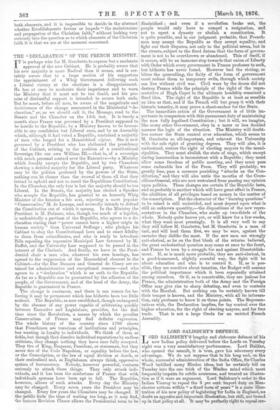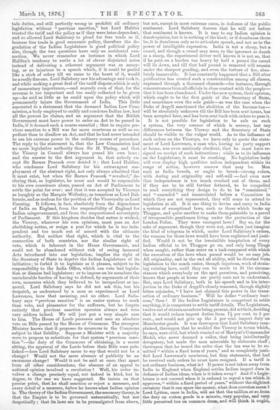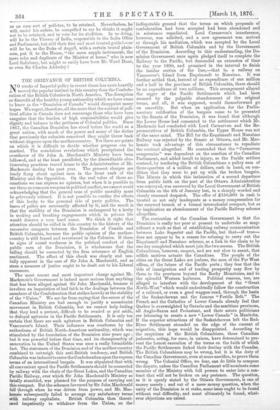LORD :SALISBURY'S DEFENCE.
LORD SALISBURY'S lengthy and elaborate defence of his new Indian policy delivered before the Lards on Tuesday night was a very unsatisfactory performance. Lord Halifax, who opened the assault, it is true, gave his adversary every advantage. We do not suppose that in his long and, on the whole, successful administration of the India Office, Sir Charles Wood imbibed many Hindoo ideas, but he certainly fell on Tuesday into the one trick of the Efindoo mind which most frequently impairs its subtle acuteness, and treated an illustra- tion as if it were an argument. Lord Salisbury's order to the Indian Viceroy to repeal the 5 per cent, import duty on Man- chester cottons within" a-fixed term of years" is a mere illus- tration of his new policy of legislatiug [for India in England, no doubt an apposite and important illustration, but still, not bound up in that policy at all. It maybe perfectly right to repeal car- tam n duties, and still perfectly wrong to prohibit all ordinary legislation without "previous sanction," but Lord Halifax treated the tariff and the policy as if they were inter-dependent, and so allowed Lord Salisbury to plead for free trade as if, because free trade is good economic policy, therefore the de- gradation of the Indian Legislature is good political policy also, though the two questions have only an accidental con- nection. We never remember an instance in which Lord Halifax's tendency to recite a lot of clever disjointed notes instead of delivering a coherent argument was so annoy- ing, or so injurious to a speech which, if it could be peeled like a stick of celery till we came to the heart of it, would be a really fine one. Lord Salisbury saw his advantage and took it, and while making a great deal of the tariff diepute,which is only of momentary importance,—and scarcely even of that, for the revenue is too important and too easily collected to be given up—he said as little as he could upon the policy which will permanently injure the Government of India. This little amounted to a statement that the deceased Indian Law Com- mission, a body employed to codify and condense Indian law, had all the powers he claims, and an argument that the British Government must have power to order an Act to be passed in India, if it deemed such a course essential ; that to require pre- vious sanction to a Bill was far more courteous as well as ex- pedient than to disallow an Act, and that he had never intended to use his extreme power in the ordinary course of procedure. The reply to the statement is, that the Law Commission had no more legislative authority than Sir H. Thring, and that the Viceroy in Council always has passed his own laws ; and the answer to the first argument is, that nobody ex- cept Sir Barnes Peacock ever denied it ; that Lord Halifax, who condemns Lord Salisbury for his extravagant em- ployment of the abstract right, not only always admitted that it must exist, but when Sir Barnes Peacock "revolted," de- claring that, as legislator, he must and would be responsible to his own conscience alone, passed an Act of Parliament to settle the point for ever; and that it was accepted by Viceroys as haughty as the Marquis Wellesley, as tenacious as Lord Dal- housie, and as zealous for the position of the Viceroyalty as Lord Canning. It follows, in fact, absolutely from the dependence of India on England, from the responsibility of England for Indian misgovernment, and from the unquestioned sovereignty of Parliament. If this kingdom decides that suttee is wicked, the Viceroy, whatever his own opinions, must pass an Act abolishing suttee, or resign a post for which he is too inde- pendent and too much out of accord with the ultimate authority. But neither that right, which is vital to the connection of both countries, nor the similar right of veto, which is inherent in the Home Government, and could not be abandoned without risk of seeing immoral Acts introduced into our legislation, implies the right of the Secretary of State to deprive the Indian Legislature of its initiative ; to forbid it to legislate as it pleases, subject to its responsibility to the India Office, which can veto bad legisla- tion or dismiss bad legislators; or to impose on its members the unendurable burden of having to defend, by arguments of their own, measures which they believed to be inexpedient or im- moral. Lord Salisbury says he did not ask this, but hie despatch, as understood by a man so experienced as Lord Lawrence, bore that meaning, and no other. Lord Salis- bury says "previous sanction" is an easier system to work than veto, and pleasanter for the sufferers, but he forgets entirely that previous sanction operates always and veto very seldom indeed. We will just put a very simple case to him. The House of Lords possesses and uses an absolute veto on Bills passed by the House of Commons. The strongest Ministry knows that it proposes its measures in the Commons subject to that liability. Suppose a Minister with a majority were to propose to substitute for that system "previous sanc- tion "—the duty of the Commons of obtaining, in a secret sitting, the approval of the Lords before their Bills were pub- lished—does Lord Salisbury mean to say that would not be a change ? Would not the mere absence of publicity be an enormous change? Would it not be said at once, that apart from all other considerations, the absence of an appeal to national opinion involved a revolution ? Well, his order in- volves a change precisely equal, not indeed in kind, but in degree, to the one we have suggested. He insists on that precise point, that he shall sanction or reject a measure, and every detail of a measure, before he knows what Indian opinion is. The theory of the Indian Government, the necessary theory, is that the Empire is to be governed automatically, but not despotically ; that its laws are to be promulgated from above, but not, except in most extreme cases, in defiance of the public sentiment. Lord Salisbury decrees that he will act before that sentiment is known. It is easy to say Indian opinion is dumb opinion, but it is nothing of the kind; or if dumbness there be, it is dumbness only as to articulate speech, and not as to the power of intelligible expression. India is not a sheep, but a camel, and though a camel may seem to the ignorant as dumb as a sheep, the experienced driver well knows it is not so, that if he puts on a burden too heavy by half a pound the camel will lie down, and till that half pound is removed will remain under the sharpest goading, and even the torture of fire, abso- lutely immovable. It has constantly happened that a Bill after publication has created such a consternation among all classes, expressed through a thousand channels—for instance, through remonstrances from all officials in close contact with the people— that it has been abandoned. Under the new system, their opinion, which ought to be the first guide of the Secretary of State, and sometimes even the sole guide—as was the case when the Duke of Argyll sanctioned the abolition of the Income-tax— will be absolutely unknown till the Bill has been sent home, has been accepted here, and has been sent back with orders to pass it.
It is not possible for legislation to be safe on such a system, the very essence of which is secrecy, lest any differences between the Viceroy and the Secretary of State should be visible to the vulgar world. As to the influence of such orders on the Viceroys, we have only to quote the state- ment of Lord Lawrence, a man who, having no party support at home, was even anxiously obedient, that he must have re- signed on receipt of such instructions ; while as to its influence on the Legislature, it must be crushing. No legislative body will ever display high qualities unless independent within its range of action, however narrow that may be. Mon such as India breeds, or ought to breed—strong rulers, with daring and originality and self-will — feel even now that independence is too much crushed out of them, and if they are to be still further fettered, to be compelled to send everything they design to do to be " considered " and " amended " and emasculated before a Committee in which they are not represented, they will cease to attend to legislation at all. It is one thing to devise and carry in India a system of exceptional laws, such as those which broke up Thuggee, and quite another to make them palatable to a parcel of irresponsible gentlemen living under the protection of the London Police. They were emergent laws ? Say so, for the sake of argument, though they were not, and then just imagine the kind of telegram in which, under Lord Salisbury's orders, the reasons for those laws would have been explained and justi- fied. Would it not be the irresistible temptation of every Indian official to let Thuggee go on, and only hang Thugs when caught, rather than enter on a task compared with which the execution of the laws when passed would be an easy job. All originality, and in the end all ability, will be diverted from legislation to the much easier, though injurious, work of strain- ing existing laws, until they can be made to fit the circam- stances which everybody on the spot perceives, and perceiving, knows that people at home are pretty sure not to understand. But, says Lord Salisbury, both in his speech and in his inter- jection in the Duke of Argyll's closely reasoned, though slightly bitter rejoinder, "I have not claimed this power in the trans- action of ordinary business." Will he define "ordinary busi- ness," then If the Indian Legislature is competent to settle anything, it is competent to settle tariff details. The Legislature, twelve out of sixteen members being present, did settle it, deciding that it would reduce import duties from 7i per cont. to 5 per cent., and would not give up the 5 per cent. import duty on Manchester goods. It was thereupon that Lord Salisbury com- plained, thereupon that he scolded the Viceroy in terms which, he says, were civil, but which remind us of Marryat's Commander Model, who never damned a sailor, that being intellectually derogatory, but made the man miserable by elaborate chaff ; thereupon that he issued the order that the tax was to be re- mitted "within a fixed term of years," and so completely justi- fied Lord Lawrence's courteous, but firm statement, that had he received such orders he must have resigned. If a tariff is not ordinary business, what is ? If power is not taken away from India to England when England settles Indian import dues in defiance of Indian ideas, when is it taken away? And. if a Lev. latnre is not coeroed when it is ordered to repeal a tax which it approves," within a fixed period of years," without the slightest certainty that it can spare the money, what does coercion mean? Lord Lytton, once in India, will see that the million or so from the duty on cotton goods is a minute, very popular, and very little perceived tax on common dress, and will think it ought, as an easy sort of poll-tax, to be retained. Nevertheless, he will, under his orders, be compelled to say he thinks it ought not to be retained, and to vote for its abolition. In so doing, will he be the Viceroy of India, responsible to the India Office and Parliament, but still their first and most trusted guide ?----or will he be, as the Duke of Argyll, with a certain brutal plain- ness, put it to the House, "the mere supple instrument, the mere echo and duplicate of the Minister at home," who is now Lord Salisbury, but might so easily have been Mr. Ward Hunt, or even Sir Charles Adderley ?




































 Previous page
Previous page